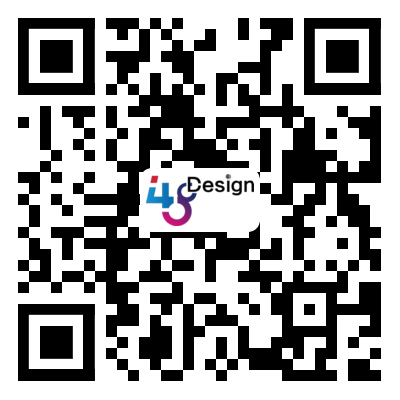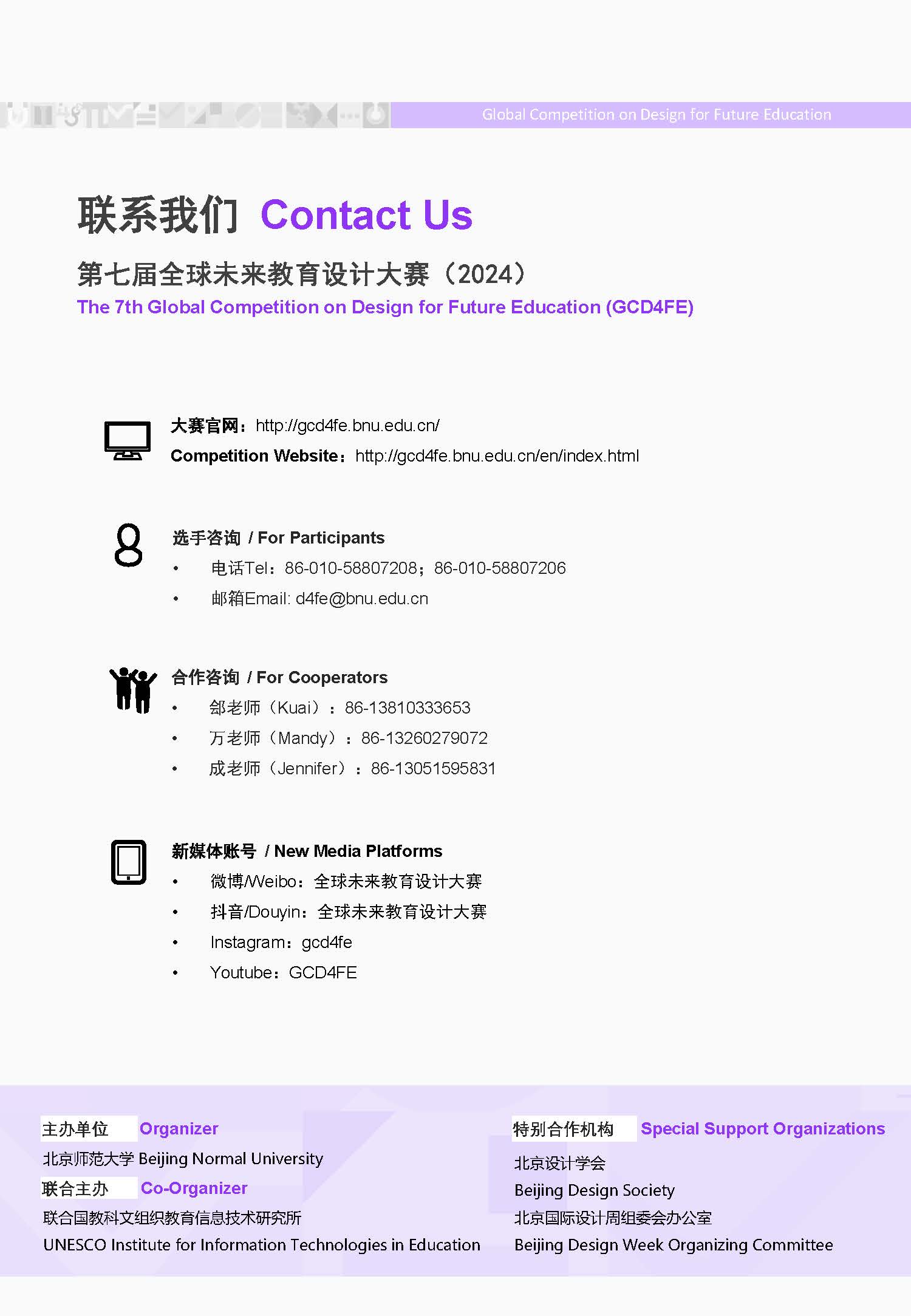To face the complex and multiple challenges in education, the United Nations calls for reshaping the global educational system. In response to the calls of UNESCO, experts, scholars, educators and students are increasingly engaged in rethinking the futures of education. Since 2018, Beijing Normal University has been hosting the annual Global Competition on Design for Future Education (GCD4FE), aiming to build an international platform to develop cooperation with international organizations, universities, and research institutes. This has been done by inviting teachers and students worldwide to explore future-oriented educational solutions for a better educational opportunity for mankind.
The 7th GCD4FE will hold "1+2"series of activities. "1" represents the main activities in four tracks, i.e., for higher education students, primary and secondary school teachers, vocational college students and enterprises. "2" signifies two monthly collection activities, namely Call for Posters and Call for Videos.
Organizers
Beijing Normal University
UNESCO Institute for Information Technologies in Education
1. Participants
Higher Education Track: Undergraduates and postgraduates from all over the world, with no limits to their majors, participate as a team of 3-5 people.
Vocational Education Track: Students in higher vocational institutions worldwide, with no limits to their majors, participate as a team of 3-5 people.
K12 Teacher Track: Primary and secondary school teachers, kindergarten teachers, and those in K12 education worldwide participate individually or in a team (≤ 5 members).
Enterprise Track: Employees in education, technology, design and other related departments in enterprises participate individually or in a team (≤ 5 members).
Call for Posters and Call for Videos: Teachers, students (including but not limited to the students in universities, colleges, and vocational institutions), and those engaged in education participate individually or in a team (≤ 5 members).
2. Themes
Main Competition Themes
AIGC and Education: How can AIGC based on their features of generating texts, videos, programming codes and 3D printings, create infinite possibilities in improving efficiency, effectiveness and equity, and make education more intelligent and effective?
Metaverse and Education: How can an immersive online space construct educational scenarios in metaverse courses, learning space design, new educational games, cultural inheritance and protection, metaverse conferences, metaverse with digital twins and educational spaces metaverse supporting various subjects, etc.?
Rural Education: What design can help solve the needs of rural areas, such as teacher shortages, students' motivation improving, learning environmental design, cultivation of technical talents, curriculum development, interdisciplinary inquiry activities based on indigenous resources, innovative design of teaching tools using digital technology, etc.?
Inclusive Education: How can an educational model help provide appropriate, high-quality education to promote educational equality? Consider people with physical disabilities and health impairments, the elderly, girls and women, students with learning difficulties, gifted children, vulnerable groups affected by war conflicts or crises, etc.?
Educational neuroscience: How to integrate neuroscience, psychology, and education to design scientific and practical educational solutions based on evidence, including policy design, curriculum design, instructional design, evaluation design, educational culture and space design, teaching aids and toys design, artificial intelligence metaverse design, and so on, to improve the quality of education and teaching?
Monthly Collection Activities
Call for Posters: My Vision for the Futures of Education
Call for Videos: Shorts on Contextual Teaching and Learning
3. Arrangement
Main Competition
First Round
1) Online Registration and Work Submission: March 1st-May 31st, 2024
(Notes: The deadline for Registration for the Higher Education Track is April 30th.)
2) Work Review and Results Announcement: June, 2024
Finals
1) Pre-Finals: July-August, 2024
2) Global Finals: September-October, 2024
Monthly Collection Activities
1) Work Submission and Public Review: March 1st-June 30th, 2024
2) Annual Review and Results Announcement: July-August, 2024
3) Awarding and Work Promotion: September-October, 2024
4. Registration

Official website: http://gcd4fe.bnu.edu.cn/en/index.html
Main Competition(including Four Tracks): Register through the official website.
Call for Posters: Download the application form on the official website and submit the poster and application form to the email: d4fe@bnu.edu.cn
Call for Videos: Check details from the official website and submit works in one of the following three ways:
1) E-Library platform initiated by UNESCO IITE: https://elibrary.iite.unesco.org/
2) Chinese version of E-Library platform: https://elibrary101.iite.unesco.org/
5. Submission
Higher Education Track and Vocational Education Track:1) Project PPT; 2) Project Design Report; 3) Poster; 4) Video.
K12 Teacher Track and Enterprise Track: 1) Case-study Collection File; 2) Supplementary Materials.
(Notes: Details of the products or outcomes involved in the entry, like apps, websites, course plans, etc., or introduction of team members' division of labor and teamwork highlights can be further shown through additional videos or attachments. Please refer to the official website for details of entry requirements.)
6. Benefits
Participate in the competition, and you will have the opportunity to receive the following benefits:
1) To participate in events organized by the World Digital Education Alliance;
2) To win bonus and certificates of honor;
3) Winning projects to be included in the GCD4FE Collection of Excellent Projects;
4) Winning projects to be featured in the E-Library initiated by UNESCO IITE, accompanied by an inclusion certificate;
5) Winning works to be displayed in international exhibition activities such as the Beijing International Design Week;
6) Winning works can be transformed into achievements, such as intellectual property rights, patents, papers, etc.;
7) To be invited to attend the conferences hosted by Beijing Normal University, such as the Global Smart Education Conference, etc.;
8) To receive internship opportunities and letters of recommendation, etc.;
9) To help participants apply for other projects and awards.
7. Highlights





